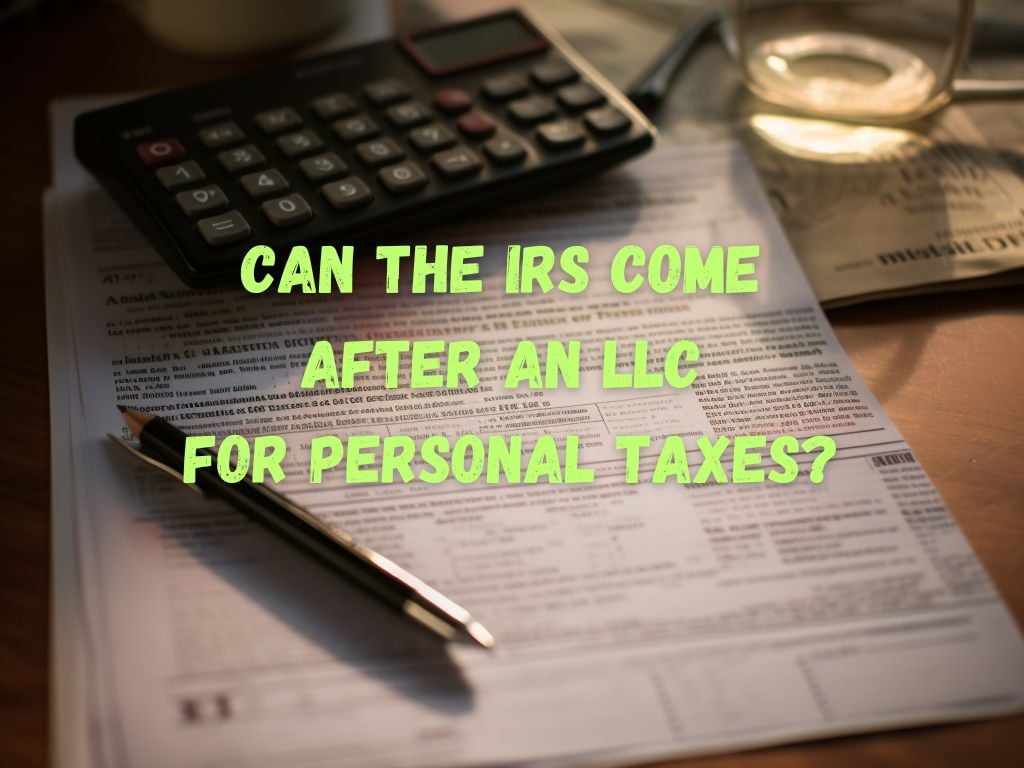The limited liability company or LLC is one of the most common business types that entrepreneurs choose when starting a business.
An LLC offers several advantages such as liability protection, flexible tax structure, and ease of operation.
But what happens when the IRS comes knocking at your door for personal taxes? Can the IRS come after an LLC for personal taxes?
In this article, we’ll explore the relationship between LLCs and personal taxes, and discuss the circumstances under which the IRS can hold LLCs and their members liable for personal tax obligations.
Understanding LLCs and Personal Taxes
What is Pass-Through Taxation?
One of the unique features of LLCs is that they are considered pass-through entities for tax purposes.
This means that the LLC itself does not pay taxes on its income. Instead, the income of the LLC passes through to the personal tax returns of the LLC’s owners, referred to as members.
The members are then responsible for paying personal taxes on their share of the LLC’s income.
For federal tax purposes, an LLC can choose to be taxed as either a sole proprietorship, a partnership, an S corporation, or a C corporation.
The choice of tax classification depends on various factors such as the number of members in the LLC, the business’s profitability, and the need for flexibility in tax planning.

Separate Legal Entity Concept and Liability Protection
One of the main reasons business owners choose to form an LLC is to protect their personal assets from business liabilities.
The concept of a separate legal entity means that an LLC is treated as a distinct entity from its members.
This means that the LLC can own property, enter into contracts, and sue or be sued in its own name.
This separation also extends to liabilities. If an LLC incurs a debt or a legal judgment, only the LLC’s assets are at risk, and not the personal assets of the members.
This liability protection is not absolute, and there are situations where members can be held personally liable for the LLC’s debts and obligations.
Tax Obligations of LLCs
LLCs have tax obligations at both the federal and state levels.
Federal tax obligations include filing an annual tax return with the IRS, paying self-employment tax if the LLC has more than one member, and paying estimated taxes throughout the year.
Failure to meet tax obligations can result in penalties, interest, and the IRS pursuing collection efforts.
State tax obligations vary depending on the state where the LLC is registered and operates.
In some states, LLCs are required to file an annual report or pay an annual fee. Failure to meet state tax obligations can result in penalties, suspension of business privileges, and in some cases, involuntary dissolution of the LLC.
Filing Taxes as an LLC
For tax purposes, LLC members report their share of the LLC’s income or loss on their personal tax return using Schedule C (Form 1040), Profit or Loss From Business or Schedule E (Form 1040), Supplemental Income and Loss.
The choice of schedule depends on the LLC’s tax classification.
LLCs classified as sole proprietors or partnerships must complete Schedule C. While LLCs classified as S Corporations or C Corporations use Schedule E.
Members must attach a Schedule K-1 (Form 1065), Partner’s Share of Income, Deductions, Credits, to their personal tax return, which shows their share of the LLC’s income or loss.
Personal Tax Obligations of LLC Members
LLC members are responsible for paying personal taxes on their share of the LLC’s income.
Self-employment tax is calculated on the LLC member’s earned income and is used to fund Social Security and Medicare.
LLC members must pay estimated taxes quarterly based on their expected income and tax liability for the year.
Underpayment of estimated taxes can result in penalties and interest from the IRS. Members may also need to pay state and local taxes depending on where the LLC operates.

Can The IRS Come After an LLC for Personal Taxes?
While LLCs provide liability protection, members and the LLC are still subject to federal and state taxes, including personal taxes.
The IRS can come after an LLC for personal taxes if the LLC fails to meet its tax obligations.
The IRS’s ability to hold LLCs and members personally liable for personal tax obligations depends on various factors such as the LLC’s tax classification, tax structure, and business practices.
Overview of LLC Taxation
The IRS views LLCs as transparent entities, and the members will be responsible for paying taxes on their share of the LLC’s income or losses.
According to Section 301.7701-2 of the Internal Revenue Code, LLCs classified as partnerships and sole proprietorships are treated as pass-through entities for tax purposes.
How the IRS Audits LLCs
The IRS has the authority to audit LLCs to ensure compliance with tax laws and regulations.
During an audit, the IRS may review the LLC’s tax returns, bank statements, financial records, and communication with clients or vendors.
The IRS may also schedule interviews with LLC members or request additional documentation to verify information reported on tax returns.
The Trust Fund Recovery Penalty
The Trust Fund Recovery Penalty (TFRP) allows the IRS to hold individuals personally liable for unpaid payroll taxes of an LLC.
Payroll taxes include Social Security and Medicare taxes, unemployment tax, and income tax withheld from employee paychecks.
If an LLC fails to pay payroll taxes, the IRS can issue a TFRP assessment against the responsible person, which can include LLC members, officers, or employees, depending on who has control over the payment of payroll taxes.
The penalty is equal to the unpaid amount of payroll taxes and can be assessed against multiple individuals.
The Alter Ego Doctrine
The Alter Ego Doctrine allows the IRS to bypass LLC liability protection and hold members personally liable if the LLC fails to operate as a separate legal entity from its members.
This usually occurs if LLC members commingle personal and business funds or use the LLC as a front to engage in unlawful activities.
The IRS may invalidate the LLC’s separate legal status and hold members personally liable for the LLC’s debts and obligations.
LLC members can protect themselves by maintaining accurate accounting records, separating personal and business funds, and ensuring that the LLC operates as a legitimate business entity.

Cases Where the IRS Can Go After an LLC for Personal Taxes
The IRS can go after LLCs for personal taxes if the LLC fails to meet its tax obligations, such as filing tax returns, paying taxes, or paying penalties and interest.
The IRS may levy the LLC’s bank accounts, seize the LLC’s property, or even dissolve the LLC to satisfy tax debts.
If the LLC has insufficient assets to pay its tax debts, the IRS can pursue the LLC’s members to collect unpaid taxes.
In some cases, the IRS may hold members personally responsible for the LLC’s entire tax debt if they are found to have engaged in fraudulent or illegal activities.
What Can LLCs and LLC Members Do to Prevent Being Targeted by the IRS?
LLC members can take various steps to minimize the risk of being targeted by the IRS. Here are a few tips:
Maintain Accurate Accounting Records
LLC members should keep accurate accounting records to ensure that taxes are filed correctly and on time.
Keeping records of business income and expenses, bank statements, and payroll records can help prevent discrepancies in tax returns.
File Taxes on Time
LLCs should file tax returns on time to avoid late filing penalties. Members should also pay estimated taxes throughout the year to avoid underpayment penalties.
Operate the LLC as a Separate Legal Entity
To avoid triggering the Alter Ego Doctrine, LLC members should maintain a clear separation between personal and business finances.
Members should not commingle personal and business funds or use the LLC as a front for personal activities.
Avoid Co-mingling of Funds
In addition to maintaining a clear separation between personal and business finances, LLC members should avoid using LLC funds for personal expenses.
This practice is known as funds commingling and can result in the IRS disregarding the LLC’s separate legal entity and holding members personally liable.
Make Timely Payment of Payroll Taxes
LLCs should ensure that payroll taxes are paid on time to avoid the Trust Fund Recovery Penalty.
Members should monitor the payment of payroll taxes and take swift action if there are any issues.

Frequently Asked Questions (FAQs)
What Happens When an LLC Can’t Pay Its Taxes?
If an LLC is unable to pay its taxes, the IRS may levy the LLC’s bank accounts, seize property, or even dissolve the LLC. If the LLC’s assets are insufficient to pay tax debts, the IRS may pursue LLC members to collect unpaid taxes.
Can the IRS Collect Taxes Directly from LLC Members?
Yes, the IRS can collect taxes directly from LLC members if the LLC fails to meet its tax obligations. This can happen if the LLC has no assets or if its assets are insufficient to pay tax debts.
What is the Best Tax Classification for My LLC?
The tax classification for an LLC depends on several factors such as the number of members, the business’s profitability, and the need for flexibility in tax planning.
It’s important to consult with a tax professional to determine the best tax classification for your LLC.
Do I Need to Hire an Accountant for My LLC?
While it is not a legal requirement to hire an accountant for an LLC, it is highly recommended. An accountant can help maintain accurate accounting records, advise on tax planning strategies, and assist with tax filings.
How Can I Correctly Report Self-Employment Taxes as an LLC Member?
As an LLC member, you must report self-employment taxes on your personal tax return using Schedule SE (Form 1040), Self-Employment Tax.
The self-employment tax rate is 15.3% and applies to net earnings from self-employment up to a certain limit.
Conclusion
LLCs offer advantages such as liability protection, flexible tax structure, and ease of operation.
However, LLCs and their members are not immune to personal tax obligations.
The IRS can hold LLCs and members personally liable for personal tax obligations if the LLC fails to meet its tax obligations or engage in illegal activities.
To mitigate the risk of being targeted by the IRS, LLCs and their members should maintain accurate accounting records, file taxes on time, avoid commingling funds, manage payroll taxes, and maintain the LLC’s separate legal entity status.
By doing so, LLCs and their members can protect themselves from personal liability and ensure that their businesses continue to operate successfully.


 Tags:
Tags:










